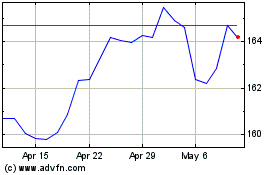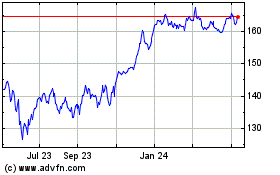By Drew FitzGerald
Lawyers delivered their final arguments in the antitrust fight
over the merger of T-Mobile US Inc. and Sprint Corp., as Wall
Street grows more nervous about the wireless deal's fate.
U.S. District Judge Victor Marrero closed the trial by promising
to try to render a decision "as soon as possible." He didn't offer
a public timeline.
Shares of Sprint are trading at a more than 40% discount to the
value of T-Mobile's proposed all-stock deal, which is now worth
about $34 billion after steady gains in T-Mobile's market value. It
is the widest gap since the merger of the two cellular providers
was struck nearly two years ago.
The discount has doubled in recent months as the companies have
tangled in court with a group of state antitrust officials led by
California and New York, a sign of growing doubts about the
deal.
"The market's getting more pessimistic," said Ric Prentiss, an
analyst at investment bank Raymond James. He said investors are
waking up to the risk that "if this deal doesn't go through,
Sprint's going to go down pretty hard."
The states argue that combining the country's third- and
fourth-biggest cellphone carriers would hurt consumers. They have
maintained their opposition to the deal despite a series of
concessions that the Justice Department and the Federal
Communications Commission wrested from both companies last
year.
Officials from 13 states and the District of Columbia -- all
Democrats -- took the case to trial in December, forcing several
high-profile industry executives to testify about the transaction's
merits.
T-Mobile boss John Legere returned to the courtroom Wednesday to
hear the closing arguments along with Sprint Chairman Marcelo
Claure and CEO Michel Combes. New York Attorney General Letitia
James and officials from several other states also attended the
hearing, which stretched over four hours.
"I understand that the plaintiffs have brought out the big
guns," Judge Marrero quipped at the start of the hearing, referring
to Ms. James -- jokingly asking whether the defense was expecting
the U.S. Attorney General in its own corner.
The Justice Department in a court filing last month defended the
merger subject to certain conditions, but didn't join as a party in
the antitrust trial. The litigation has exposed tensions between
the Trump administration's top antitrust cops and their state-level
counterparts.
Makan Delrahim, the head of the Justice Department's antitrust
division, said he worries the merger market could suffer if the
states prevail. Expert federal agencies found problems with the
merger -- and fixed them, he said.
"I think if the states win, it creates major uncertainty in
M&A," Mr. Delrahim said in an interview with the Journal,
adding that he hopes the companies will appeal if they lose.
Speaking Wednesday outside the courthouse before closing
arguments began, New York's Ms. James said she was confident the
coalition had proven its case.
Either side could appeal Judge Marrero's decision. But the
merger agreement has lapsed, allowing either Sprint or T-Mobile to
walk away without paying a penalty. The diverging fortunes of the
two companies and current market realities could prompt the
companies to renegotiate the terms if they extend the deal.
Asked if there might be a pattern of state attorneys general
intervening in deals, Ms. James said she would work with
counterparts across the country to uphold the law.
"I don't know if it's going to be a pattern. I just know that
New York state attorney general and other attorneys general all
across this nation will continue to stand up for the law," she
said, adding that the group was operating within its sovereign
powers.
Both sides' attorneys on Wednesday offered the judge competing
arguments about the states' authority to challenge a consequential
transaction that federal officials already reviewed.
"The states stand in the shoes of a private litigant here,"
T-Mobile attorney David Gelfand said. "They're not entitled to any
special treatment."
Glenn Pomerantz, a lawyer for the states, said the states
brought the case on behalf of their residents under established
legal precedents. He said the state coalition wasn't convinced the
Justice Department's solution would do enough to protect
competition in the market for consumer cellphone plans.
"Your honor, let them compete," Mr. Pomerantz said.
Sprint shares ended Tuesday at $4.86. T-Mobile closed at $80.27.
Japan's SoftBank Group Corp. owns more than 80% of Sprint's shares
while Deutsche Telekom AG controls T-Mobile. Sprint's relatively
small number of shares floated on the open market has deepened its
latest stock swoon.
T-Mobile and Sprint have argued that joining forces would create
a stronger and more efficient competitor to market leaders Verizon
Communications Inc. and AT&T Inc. Many of the benefits stem
from their complementary spectrum-license holdings, which would
lower the combined company's costs for streaming music, videos and
other data to its customers.
Wall Street analysts say T-Mobile stands to gain billions of
dollars in market value if it clinches the merger, though it is
also considered a relatively safe bet without Sprint. The company
added more than one million cellphone subscribers in the fourth
quarter, continuing a trend of customer gains at competitors'
expense.
T-Mobile's merger partner faces a worse prognosis. Sprint hasn't
yet reported the last quarter's results, but the company has
struggled to hold on to its most lucrative customers. It has lost
money in four of the past five fiscal years.
Sprint's Mr. Combes testified in December that his company
offers "an inferior product" that puts it in a "vicious cycle" of
customer losses and dwindling resources. But he and other
executives stopped short of saying the company would disappear in
the next two years.
The states challenged the companies' direst predictions during
the trial, drawing parallels between T-Mobile's weak footing in
2011, after government opposition forced it to scuttle a planned
tie-up with AT&T, and Sprint's current predicament. A recent
court filing from the states took a glass-half-full view of its
situation.
"With the right leadership and a commitment to innovation,
Sprint can follow T-Mobile's precedent and strengthen its
competitive position," the states wrote.
--Sarah Krouse and Brent Kendall contributed to this
article.
Write to Drew FitzGerald at andrew.fitzgerald@wsj.com
(END) Dow Jones Newswires
January 15, 2020 18:14 ET (23:14 GMT)
Copyright (c) 2020 Dow Jones & Company, Inc.
T Mobile US (NASDAQ:TMUS)
Historical Stock Chart
From Mar 2024 to Apr 2024

T Mobile US (NASDAQ:TMUS)
Historical Stock Chart
From Apr 2023 to Apr 2024
